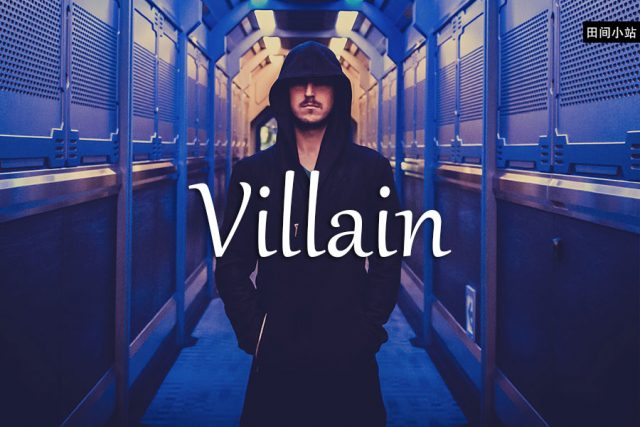本文经授权转载自微信公众号:田间小站

TEM8
外刊例句
- Venture capitalists, he concluded, resembled classic villains: “alternately cowardly, greedy, sneaky and overbearing”.
风险投资家就像典型的恶棍,他总结道:“时而懦弱,时而贪婪,时而卑鄙,时而霸道” 。
——《经济学人》 - Democrats had been struggling to make Donald Trump the prime villain in their election narrative.
民主党人一直在竭力让唐纳德·特朗普成为他们选举叙事中的头号反派。
——《纽约时报》
基本释义
[noun] (in a film, novel, or play) a character whose evil actions or motives are important to the plot
[名词] (电影、小说或戏剧中)其邪恶行为或动机对情节很重要的角色
深入解读
Villain 一词源自拉丁语 villa (乡间别墅,农场),先后经中古拉丁语 villanus (农场工人)以及古法语和英国法语 vilain (农民、平民、粗野的人、乡巴佬)进入英语后,原先也是用来表示“乡巴佬、粗汉”,即卑贱的或出生低微的乡下人。
而从社会地位的卑贱出发, villain 逐渐转向人品的卑贱,也就是用来表示“恶棍、流氓”,主要指完全沉溺于犯罪、邪恶和卑鄙中的人,为了得到自己想要的东西而蓄意违法或伤害他人,比如:
- 一伙形形色色的流氓坏蛋
a menagerie of villains - 20世纪的英雄豪杰与罪魁祸首
the heroes and villains of the 20th century - 有几个恶棍劫走了寡妇的所有积蓄。
Some villains robbed the widow of all her savings.
这个概念到了1822年后,开始用来表示小说、戏剧、电影等中的“反派角色、反面人物”,也就是故事情节中与英雄对立的角色,其邪恶行为或动机对情节很重要,比如:
- 漫威十大反派
Top 10 Marvel villains
此外, villain 还可以用来喻指“元凶、祸首、症结”,即对造成特定问题、弊病、伤害、损害等负有责任的人或事物,以及用本义指“剧中反面人物”的习语 villain of the piece 戏谑表示“首恶、头号问题”,比如:
- 工业化国家是破坏环境的真正元凶。
Industrialized nations are the real environmental villains. - 尼科莱特是罪魁祸首,所有乱子都是她引起的。
Nicolette’s the villain of the piece, since she’s the person who started all this trouble.
名著用例
He loved to make advances to women, to have them succumb to his charms, not because he was a cold-blooded, dark, scheming villain, but because his inborn desire urged him to that as a chief delight.
他喜欢追女人,喜欢她们拜倒在他的魅力之下,这并不是因为他是个冷酷无情,心地阴暗,诡计多端的恶棍,而是因为他天生的欲望驱使着他这么做,这是他的主要乐趣。
出自美国现实主义作家西奥多·德莱赛(Theodore Dreiser)创作的长篇小说《嘉莉妹妹》(Sister Carrie)。参见:名著下载 | 嘉莉妹妹(Sister Carrie)
同近义词
- bandit: a robber or outlaw belonging to a gang and typically operating in an isolated or lawless area
- criminal: a person who has committed a crime
- outlaw: a person who has broken the law, especially one who remains at large or is a fugitive